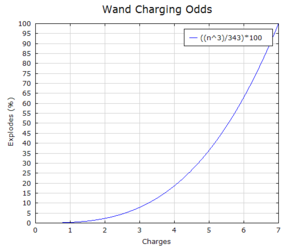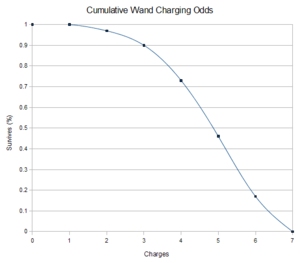Charging
- For magically improving weapons and armor, see scroll of enchant weapon and scroll of enchant armor.
Some items, like wands, magic harps, horns of plenty, brass lanterns and the Bell of Opening are only effective for a finite number of uses. Each potential use is called a charge, and charging is the process of adding more charges to an item. The most common methods of charging are the scroll of charging and the Platinum Yendorian Express Card.
Such items are shown with two numbers at the end of their description when fully identified, e.g. a wand of magic missile (0:5). The first number is how many times the item has been recharged, and the second is the number of charges remaining. The recharge counter stops at (7:y),[1] though the item can still be recharged further if applicable. A discharged item is (x:0), and a canceled item is (x:-1).
Repeated charging is potentially problematic. A wand charged more than once might explode; this is why nearly all players reduce a wand to 0 charges before charging it. A wand of wishing charged the second time always explodes; thus players with a wand of wishing (1:0) should always wrest the last wish (zap the wand repeatedly) instead of charging.
Contents
Wands
If a wand has been recharged at least once before, there is a chance it might explode, destroying itself. A wand of wishing always explodes if recharged more than once. For other wands, the chance of an explosion is n3 / 343, where n is the number of times the wand has been recharged before. This is summarized in the following table:[2]
| Times recharged | 0 | 1 | 2 | 3 | 4 | 5 | 6 | 7 |
|---|---|---|---|---|---|---|---|---|
| Chance of exploding | (never) | 0.29% | 2.33% | 7.87% | 18.66% | 36.44% | 62.97% | (always) |
And the combined, cumulative probability of working towards maximum charges:
| Times recharged | 0 | 1 | 2 | 3 | 4 | 5 | 6 | 7 |
|---|---|---|---|---|---|---|---|---|
| Cumulative chance | (never) | 0.29% | 2.62% | 10.28% | 27.02% | 53.62% | 82.83% | (always) |
And thus the expected average, per wand, is 5.2334 charges before the wand explodes.
An exploding wand deals between 1 and 2(maxhp+1)/3 damage,[3] so don't risk it if you're below full HP or in a place that isn't safe.
If the wand does not explode, it gains some charges.
Blessed charging picks a number of charges between the wand's natural maximum charges and (max charges − 4) inclusive, with all values having equal probability,[4] excluding wands of wishing for which 3 is always chosen.[4][5] This is summarized by the following probability table:
| Wand type | Number chosen | ||||||||||||||
|---|---|---|---|---|---|---|---|---|---|---|---|---|---|---|---|
| 1 | 2 | 3 | 4 | 5 | 6 | 7 | 8 | 9 | 10 | 11 | 12 | 13 | 14 | 15 | |
| wand of wishing | (always) | ||||||||||||||
| directional | 20% | 20% | 20% | 20% | 20% | ||||||||||
| non-directional | 20% | 20% | 20% | 20% | 20% | ||||||||||
Uncursed charging chooses a number in the same way as blessed charging, then reduces the number to a value between 1 and the chosen number inclusive.[6] The net result is summarized by the following probability table:
| Wand type | Number chosen | ||||||||||||||
|---|---|---|---|---|---|---|---|---|---|---|---|---|---|---|---|
| 1 | 2 | 3 | 4 | 5 | 6 | 7 | 8 | 9 | 10 | 11 | 12 | 13 | 14 | 15 | |
| wand of wishing | 33.3% | 33.3% | 33.3% | ||||||||||||
| directional | 17.69% | 17.69% | 17.69% | 17.69% | 12.69% | 8.69% | 5.36% | 2.5% | |||||||
| non-directional | 7.79% | 7.79% | 7.79% | 7.79% | 7.79% | 7.79% | 7.79% | 7.79% | 7.79% | 7.79% | 7.79% | 5.97% | 4.30% | 2.76% | 1.33% |
For both blessed and unblessed charging, the wand's number of charges is set to the chosen value.[7] If the wand already has that many charges (or more), it instead gains one charge.[8] If this extra charge brings a wand of wishing to more than 3 charges, it explodes.[9] (Other wands glow blue if charged beyond their natural maximum, but suffer no ill effects.[10])
Cursed charging sets the wand's number of charges to 0, unless the wand itself is blessed. This happens even if the wand was at (x:-1), i.e. it was canceled.[11]
Rings
Rings with numerical enchantment levels—namely, adornment, gain strength, gain constitution, increase accuracy, increase damage, and protection—may be charged to alter their enchantment.
Before the ring is charged, there is a chance it might explode. A +n ring has an n⁄7 probability of exploding if 0 < n < 7, or a 100% probability if n ≤ -5 or n ≥ 7. An exploding ring deals 1d(3×|n|) damage to the player.[12] If the ring does not explode, its enchantment is updated according to the scroll's BUC, with blessed charging adding 1–3 points, uncursed charging adding 1, and cursed charging subtracting 1–2 points.
Tools
All chargeable tools may be recharged any number of times without ill effect, with the exception of magic markers.
For all tools, cursed charging reduces the number of charges to 0, unless the item itself is blessed, in which case nothing will happen.
| Tool | Uncursed charging adds | Blessed charging adds | Maximum | Notes |
|---|---|---|---|---|
| Bell of Opening | 1 | d3 | 5 | |
| tinning kit, expensive camera, magic marker | 10-20 | 15-30 | 127 |
|
| crystal ball | 1 | set to 6 | 5 (unless blessed charging) | |
| bag of tricks, can of grease, horn of plenty | 1-5 | 6-15 if fewer than 10 charges left; else 5-10 | 50 | |
| magic flute, magic harp, frost horn, fire horn, drum of earthquake | d4 | 2d4 | 20 | |
| oil lamp, brass lantern | 750 | 1500 | 1500 | Dipping an oil lamp in a potion of oil also fills it to 1500, though this is not magical charging. |
Yourself
If you read a scroll of charging while confused, your energy is replenished to its maximum. If it was already at maximum, the maximum is increased by 5d4, and your current energy is increased to the new maximum.[13]
The confused effect only applies to the scroll of charging. Invoking the Platinum Yendorian Express Card while confused still produces the regular charging effect.
References
- Jump up ↑ read.c in NetHack 3.4.3, line 302
- Jump up ↑ read.c in NetHack 3.4.3, line 227
- Jump up ↑ read.c in NetHack 3.4.3, line 1304
- ↑ Jump up to: 4.0 4.1 read.c in NetHack 3.4.3, line 257
- Jump up ↑ read.c in NetHack 3.4.3, line 254
- Jump up ↑ read.c in NetHack 3.4.3, line 258
- Jump up ↑ read.c in NetHack 3.4.3, line 260
- Jump up ↑ read.c in NetHack 3.4.3, line 261
- Jump up ↑ read.c in NetHack 3.4.3, line 262
- Jump up ↑ read.c in NetHack 3.4.3, line 266
- Jump up ↑ read.c in NetHack 3.4.3, line 224
- Jump up ↑ read.c in NetHack 3.4.3, line 270
- Jump up ↑ read.c in NetHack 3.4.3, line 1057
This page may need to be updated for the current version of NetHack.
It may contain text specific to NetHack 3.4.3. Information on this page may be out of date.
Editors: After reviewing this page and making necessary edits, please change the {{nethack-343}} tag to the current version's tag or {{noversion}} as appropriate.

